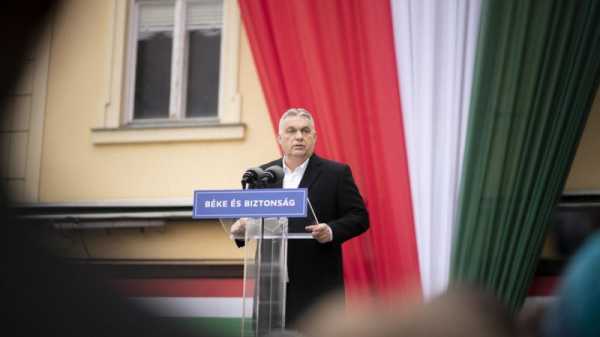
Any political strategy to counter the Orbán system in Hungary must seriously take into consideration and address the roots and narratives of its “success”, writes Peter Hefele.
Peter Hefele is a policy director at the Wilfried Martens Centre for European Studies in Brussels.
The Hungarian elections of 3 April 2022 drew remarkable attention from many observers both inside and outside the country.
Often labelled as “elections of fate (Schicksalswahl)”, they were meant to be decisive not only for the future of an already weakened Hungarian democracy but also regarding the role of Hungary in Europe.
The landslide victory of the ruling party, Fidesz, and Prime minister Viktor Orbán – they took 54.18% of the national party list vote and a crushing majority of 83% of single-member districts – came as a surprise even to Fidesz itself, who has secured a constitutional-changing supermajority for the next four years.
The leader of the six-party opposition alliance United for Hungary (Egységben Magyarországért), Péter Márki-Zay, didn’t even win in his home constituency. He has decided he will not be a member of the newly elected national parliament, although he did win a seat from the opposition’s party list, but will instead focus on Hódmezővásárhely, where he is the mayor.
This leaves the fragmented and diverse opposition parties in a deplorably weak position to act united against Fidesz in parliament. The strategic decision to not forge a new party, but rather a multi-party movement in order to overcome the cemented majority of Fidesz, has failed.
Any hopes that Márki-Zay might forge a new political party after the elections are now in shambles.
These election results are just the latest proof of how difficult it has become to overthrow this “illiberal” state-party system that Fidesz has perfected over the last years.
However, the sheer dominance of the government and party over Hungarian media and state administration, or widespread corruption, only partially explains the success of Fidesz.
Ideological fragmentation, lack of campaign coordination, and difficult political legacies for some members of the opposition alliance, as well as the social structure of the Hungarian electorate, must also be considered in any self-critical post-election analysis.
What surprised many observers was how Viktor Orbán managed to overcome the political challenges of the Russian war against Ukraine.
He fought his own legacy of close personal relations with Vladimir Putin and Hungary’s seesaw policy between East and West, which had alienated him not only from Western Europe but also from his Eastern European neighbours of the Visegrád Group.
It remains a remarkable example of political spinning to convince his electorate that only Fidesz can provide peace and security (béké és biztonság) – building on a long-established narrative of protecting national unity and identity against liberalisation and globalisation, concepts represented by the European Commission in Brussels.
What can Hungarians expect for the next four years from the old-new Fidesz government? What can its neighbours and the European Union expect? And what will be the effects on other right-wing political parties in Europe?
The trenches between the Orbán government and the European Commissions will be deepened. More than ever, Brussels must refer to the rule of law mechanism to prevent any further erosion of Hungarian democracy and support the remaining independent civil society structures.
Initial reactions from the European Commission indicate that the lines of conflict between Brussels and Budapest, from the rule of law to corruption and LGBTQ+-related education policies, will become more relevant.
Despite the Ukraine war and a massive influx of refugees to Hungary, the Commission, backed by the latest ruling of the European Court of Justice (ECJ), will not be willing to soften its approach towards Hungary, i.e. in terms of freeing the COVID-19 recovery funds.
Viktor Orbán has already thrown the gauntlet immediately after the first results of the election, clearly presenting himself as the defender of conservative, national and Christian values; of an “other Europe”.
Against this ideological background, it can be assumed that the Hungarian referendum on gender issues, held in parallel to the elections, contributed to the recent success of Fidesz.
Backed by his overwhelming victory, Viktor Orbán will definitely try to present himself as the torchbearer of right-wing political parties in Europe.
So far, any attempts to forge a new united right-wing alliance between Fidesz, VOX, PiS and RN have been unsuccessful and will also – and not least – depend on the French presidential and legislative elections and an (uncertain) consolidation of the Italian centre-right party system.
Given the weakness of non-Fidesz affiliated conservative and Christian democratic parties in Hungary, there might also be a new debate within the European People’s Party (EPP) on how it might strategically position itself toward right-wing parties and how to make up for the dramatic loss of liberal-conservative voters in Western European countries over the last decade and a profound political power shift from Western to Central and Eastern European countries.
From a broader regional and geopolitical view and regarding a united Western stand against Russian aggression, Orbán will continue to play between East and West to present himself as the best defender and Trump-like negotiator of Hungarian national interests.
That might further isolate the country, unless there is a quick resolution of the Ukraine conflict (unrealistic at best), or the West gives in to Russian demands due to the heavy economic and social consequences of its sanctions.
But the unexpected results of the Hungarian elections have also unveiled the danger of ideologically biased views on country and society; these lead to baseless expectations and hopes of many domestic and international observers, often blinded by wishful political thinking.
Any political strategy to counter the Orbán system must seriously take into consideration and address the roots and narratives of its “success”: issues such as identity and values, or social uncertainties in times of a collapsing international order and faltering globalisation – topics which democratic parties have to address and not leave to ‘strongmen’ – a challenge which extends beyond Hungary and Viktor Orbán.
Source: euractiv.com



